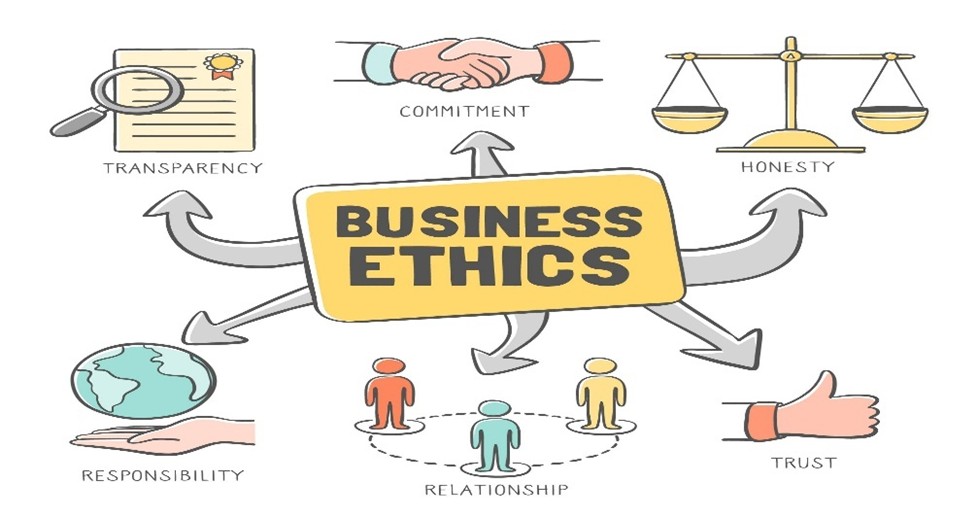
If we talk in common language, we can explain ethics as an accepted principles of right or wrong that govern the conduct of a person, the members of a profession, or the actions of an organization. In the same way, business ethics can be explained as the guiding principles that companies and individuals hold themselves to as a measure of what is right and what is wrong that means these are the accepted principles of right or wrong governing the conduct of business people .Now our main focus here is to understand what is meant by Ethics in international business ?So the simple answer to this query is that ethics in international business means the moral principles and standards that guide the conduct of individuals and organizations involved in global commerce. It encompasses the values and norms that influence decision-making and behavior in cross-border transactions. As renowned business ethicist, Michael Josephson, once stated,”Ethics is not a mystic standard detached from life . It is a practical set of rules by which we make decisions, and our decisions affect every part of our lives”. Ethics help to make certain decisions easier to evaluate based on beliefs and how to treat others. When looking at what is the role of ethics in international business it is important to take into account cultural differences as well as the socioeconomics dynamics between countries as they play important roles in how businesses make decisions on an international level.
In the realm of international business, ethics play a pivotal role in maintaining trust, credibility, and long-term relationships. It’s best captured by Johnpor C. Maxwell’s perspective, ”Ethics is not something you learn after you know everything; it is something you do every day .”
Ethical standards establish trust between parties doing business together, including both partners and customers. Organizations earn this trust by demonstrating a pattern of ethical behavior over time, gaining a reputation for fair dealing and respect for human rights and social responsibility.
When we act ethically both in business and in our private lives, it has its own reward at both places. Living ethically reflects good character and concern for the well-being of others. This leads to a sense of goodwill toward others that nurtures self-respect and inner strength.
At the same time, companies conducting their international business ethically realize higher profits by attracting business partners who share the organization’s commitment to ethics in international business. Clothing maker Patagonia is one example of a company that has earned a reputation for ethical practices by reducing its environmental impact and protecting workers’ rights in the countries where it operates.
On the other end of the spectrum are companies whose ethical lapses have cost them. Among the businesses that the public has turned against are Nikola, a trucking company that recently admitted to staging a video demonstration of its technology, and European finance technology firm Wirecard, which collapsed in 2020 after two separate ethical scandals.
Formulating and enforcing an ethics policy within an international organization and among its business partners overseas presents companies with complex challenges. Ensuring that employees and partners meet company standards for worker safety, human rights, and fair wages begins with creating a work culture of openness and caring.
Beyond presenting a code of ethical conduct for employees, an international business ethics policy must consider such practices as corporate governance, bribery, discrimination, social responsibility, and fiduciary duties.
Apart from above practices,ethical business practices include mandating truthful advertising, instituting internal quality control checks, and never profiting from insider information:
A cereal manufacturer’s ethical standards prevent it from making unsubstantiated health claims about its products, even if its competitors make such unproven assertions in their marketing.
An electronics manufacturer must halt production after defects are found during quality control checks of several batches even though the delay will cause it to miss the shipping date.
An employee who learns of a financial shortfall at a confidential internal meeting is prevented by law and by the company’s ethics policy from profiting from the information in any way.
ROLE OF CORPORATE SOCIAL RESPONSIBILITY(CSR) IN INTERNATIONAL BUSINESS

In the realm of international business, corporate social responsibility (CSR) has evolved into a pivotal concept, shaping the way companies operate globally .CSR encompasses the idea that businesses have a broader responsibility beyond merely pursuing profits .It involves integrating ethical, social, and environmental considerations into a company’s operations and interactions with stakeholders, both at home and abroad.
The role of CSR in international business is multifaceted and can be best understood through the words of renowned author and Philosopher Alain de Bottom, who said, ”A charitable heart is of the essence of religion. In CSR, we witness the transformation of the corporate world into an entity that increasingly embodies this charitable heart.”
First and foremost, CSR in international business is about ethical conduct and accountability. Companies are expected to uphold moral standards regardless of the geographic boundaries in which they operate. This involves adherence to fair labor practices, transparency in financial transactions, and responsible marketing, among other ethical considerations. These principles serve as a moral compass guiding business decision, helping to build trust and credibility in the global market.
Moreover, CSR plays a critical role in managing a company’s reputation on the international stage. In today’s interconnected world, information travels fast, and a single ethical lapse can have far-reaching consequences. As John Wooden eloquently noted.” Be more concerned with your character than your reputation because your character is what you really are, while your reputation is merely what others think you are.” By demonstrating commitment to social and environmental responsibility, companies can bolster their reputation and mitigate potential risks.
Ethical decision-making in multinational corporations
Ethical decision-making in multinational corporations (MNCs) is an essential aspect of corporate governance and responsible business behavior. Multinational companies operate in different cultural, legal and social contexts, which often pose complex ethical challenges. Here are some important principles and considerations related to ethical decision-making in multinational corporations:
1.Universal ethical standards: Multinational companies should adhere to universal ethical standards that apply to all cultures. These standards include honesty, integrity, justice, and respect for human rights. Compliance with these principle ensures consistent ethical behavior regardless of the cultural differences of the countries in which the company operates.
2.Respect for local laws and cultures: While universal ethics are important, multinational companies must also respect local laws and cultures. Ethical decision-making involves understanding and respecting the legal and cultural norms of host countries. This is about respecting local customs, traditions and business practices while ensuring that they are consistent with basic ethical principles.
3.Corporate social responsibility (CSR): Multinational companies have a responsibility to make a positive contribution to the communities in which they operate. Ethical decision-making is about integrating social and environmental considerations into business practices. CSR initiatives can include philanthropy, sustainable environmental practices, and investing in local communities to improve their well-being.
4.Transparency and responsibility: Ethical multinational companies value transparency and accountability in their operations. This includes honest and open communication with stakeholders such as shareholders, employees, customers, and the public. Transparent reporting of financial and non-financial information builds trust and demonstrates the company’s commitment to ethical practices.
5.Prevention of corruption and bribery: Multinational companies must introduce strict anti-corruption policies. Ethical decision-making prohibits bribery and corruption at all levels. Compliance with international anti-corruption laws, such as the foreign corrupt practices Act(FCPA)in the united states and the bribery Act in the United Kingdom, is critical to ethical business conduct.
6.Ethical supply chain management: Ethical considerations extend across the entire supply chain. Multinational companies must ensure that their suppliers and business partners also adhere to ethical standards. This includes assessing suppliers’ labor practices, environmental policies and compliance with human rights principles.
7.Ethical leadership and employee development: Ethical decision making starts at the top. Ethical leadership sets the tone for the entire organization. Ethical leaders promote a culture of integrity, empower employees to make ethical decisions, and providing guidance and resources to support ethical behavior.
Ethical decision-making in multinational companies is about balancing universal ethical principles with respect for local laws and cultures. It includes corporate social responsibility, transparency, anti-corruption efforts, ethical supply chain management and ethical leadership. By adhering to these principles, multinational companies can make a positive contribution to the global economic environment and have a sustainable and ethical impact on the communities in which they operate.
